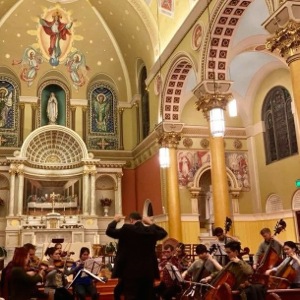
 IRECTORS of Sacred Music do not hold positions of power or prestige, but of service. No matter how lofty the repertoire, the reputation, or the budget, we are nothing but servants of the Almighty doing His will. We serve the musicians under our direction. We serve God’s people.
IRECTORS of Sacred Music do not hold positions of power or prestige, but of service. No matter how lofty the repertoire, the reputation, or the budget, we are nothing but servants of the Almighty doing His will. We serve the musicians under our direction. We serve God’s people.
With Holy Week upon us, many of us are juggling a larger number of musicians than usual, perhaps some paid, and probably many volunteers. But regardless, this is a universal matter throughout the liturgical calendar.
Here are a few essentials of musical leadership:
IDENTIFY STRENGTHS—DISPLAY THEM!
Paid or not, it’s smart business (and smart management) to identify the strengths of individual musician and of a choir and exploit those strengths! This takes an investment of attention and time. This is essential in choosing appropriate repertoire that is both comfortable and challenges.
What is even smarter is to allow individuals or an ensemble room to display their strengths. Place trust in a talented musicians in the right situations and reap the benefits—musically, personally, and spiritually.
This sounds obvious, but one may be surprised how infrequently this happens. Do so, and musicians just might love working with you.
CLEARLY EXPRESS YOUR MUSICAL DESIRES
Even with amateurs and volunteers, don’t be afraid to tell musicians exactly what you want—respectfully. Don’t dance around the issue. It does more damage to be indirect and hope someone gets the message, than to just blurt it out. And be prepared to demonstrate in a helpful manner.
I tell my choir if I’m picky and demanding, it is a compliment. It means I have placed my trust in them. I tell them the day I have no critiques is the day they should worry—that means I don’t trust them to fix a problem. Fortunately, that day hasn’t come yet.
TELL THEM WHAT THEY ARE DOING WELL
While in the midst of offering critiques, be sure to emphasize what they are doing well. Critiques are not simply a list of what they are doing wrong, but are meant to build upon what they are doing right. While this is very important with volunteers it applies to professionals as well. This offers encouragement and communicates your confidence in them. It allows musicians to continue along a positive path while building upon it to make improvements.
Maestro Francis Bardot recently told me a story of his experience in a recording session with Marcel Dupré. After each take, Dupré would indicate what went well and what was beautiful. He was kind and supportive. Then he followed his encouragement with a long list of needed improvements.
ADMIT MISTAKES. CORRECT THEM.
Admit and point out one’s own mistakes. It helps one personally connect to people under your direction. We are all human, and we are all striving towards the same goal.
It can also present an opportunity to demonstrate a correction—albeit one’s own. For me this often comes in the form of needing to be more clear with my conducting. Funny how the choir sings better when I conduct better. Maybe I should conduct better! I note places where I need to improve and practice. The choir and musicians deserve my best effort.
Some friends of mine have played under the baton of composer and conductor John Williams. He probably never makes mistakes, but he has at times admitted in rehearsal “I need to be more clear” in conducting certain phrases. As a result of his genuinely respectful respectful demeanor, he has been universally loved by the musicians under him. As a result, they work harder for him.
RESPECT TIME
Have respect for people’s valuable time. Start and end rehearsals on time. Have a rehearsal plan in place before rehearsal. Be prepared.
HAVE A CHECK WAITING FOR PROFESSIONALS
Ideally have a check waiting for them on the day they play. This isn’t just a financial issue but doing so shows respect. At the very least, don’t make professionals wait long, and certainly not for weeks on end. Good players will be very happy to work for you again and again if a check arrives in a reliable fashion. I call an envelope with a check in it “musical inspiration.” Funny how when musicians are paid the day they show up, they play a lot better.
Don’t be cheap. Pay competitive rates. In fact, consider hiring fewer musicians if possible but at a higher rate. You will attract the best. They will elevate your program in quality over quantity.
HIRE THE PERSON, NOT THE POSITION
Of course one needs to hire a trumpet player or a violist if that is what someone needs. However, it is wise to hire someone who is not only a very talented musician, but a good human being. Music must inspire the heart, and it’s almost logical to hire talented people who have a beautiful heart. It’s smart personally and economically. Couple this with recognizing and utilizing strengths, and some beautiful music is certain to be made.
Talented professionals who are good people attract more talented and good-hearted volunteers. Good-hearted musicians amplify success musically, economically, and spiritually.
You also want to hire musicians who are busy and in demand. Allow them the flexibility and support to attend to their other musicals endeavors. Let them pace themselves—especially singers—to keep them healthy. It’s smart business, and they will give you even more of themselves in the long run.
EXPRESS GENUINE GRATITUDE—FREQUENTLY
Just do it. All the time. Talented and hard working musicians who sing and play for God are a gift. Life is too short to live any other way.

FINALLY, HERE ARE a few things to remember during Holy Week!
• Five Things Directors and Choirs Must Remember This Week
Soli Deo gloria
